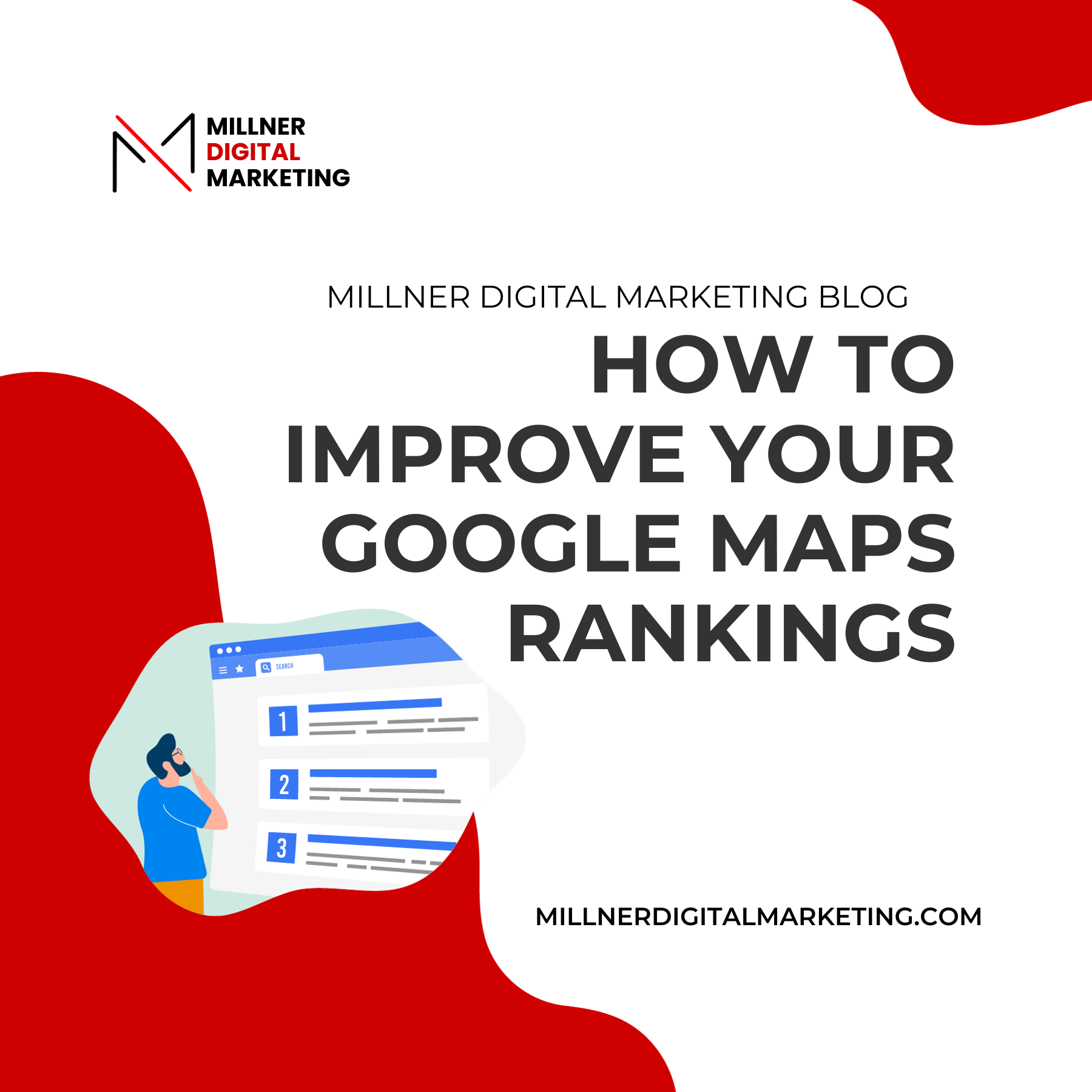Email: scottmillner@millnerdigitalmarketing.com
Phone: 706-715-5647

Why am I Losing Organic Search Traffic?
Attention local business owners! Are you noticing a decrease in your organic search traffic on Google? It can be frustrating and confusing to see the numbers decline, especially when organic search plays such a crucial role in driving traffic and potential customers to your website. But fear not, because you are certainly not alone in this dilemma. Many businesses have experienced a drop in their organic search traffic, leaving them wondering why it's happening and what they can do about it. In this blog post, we will explore some of the common reasons for declining organic search traffic and provide valuable insights to help you navigate through these challenges. So grab your favorite beverage, sit back, and get ready to learn more about why you may be losing organic search traffic on Google.

The Importance of Organic Search Traffic
Organic search traffic is a critical metric for any website or business. It refers to the visitors who land on your website as a result of unpaid search results. Unlike paid traffic that comes from online ads, organic traffic is generated from effective SEO (Search Engine Optimization) practices.
The importance of organic search traffic cannot be overstated. First, it significantly contributes to the visibility and credibility of your website. Websites on the first page of search engine results are perceived as more trustworthy, attracting more visitors and potential customers.
Furthermore, organic search traffic tends to have higher engagement rates. Visitors from organic search often spend more time on your site and explore more pages, indicating a deeper engagement with your content. This often translates into higher conversion rates as these visitors are typically further along in the buying cycle.
The importance of organic search traffic in today's digital landscape is paramount. It enhances brand visibility and drives user engagement and conversions, leading to increased business revenue. Continuing to prioritize and invest in effective SEO strategies is pivotal for businesses to thrive in the competitive online market.
How Google's Algorithm Works and Its Impact on Organic Search Traffic
Google's search algorithm, a complex system used to retrieve data from its search index and promptly deliver the best possible results for a query, profoundly influences organic search traffic. This introductory section will delve into the intricacies of how it operates and its consequential impact on the distribution and acquisition of organic search traffic.
Understanding Google's Algorithm
Google's algorithm is an intricate system used to retrieve data from its search index and deliver the most applicable results for a query. The search engine uses a combination of algorithms and numerous ranking signals to deliver webpages ranked by relevance on its search engine results pages (SERPs). Over time, Google has continued to improve and refine these algorithms, introducing updates that cater more to user intent rather than keyword usage alone. This, in turn, affects how businesses and content creators strategize for organic search traffic.
Google's Algorithm and Organic Traffic
The changes in Google's algorithm directly impact organic search traffic. When changes are made, they can either increase or decrease a website's visibility, depending on whether the site aligns with the updated parameters or not. For instance, if Google releases an update that prioritizes mobile-friendly sites, businesses with mobile-optimized websites may see a surge in their organic traffic. Conversely, those without mobile-friendly sites may see a drop. Therefore, understanding and staying on top of Google's algorithm updates is pivotal for maintaining and improving organic search traffic.
Adapting to Google's Algorithm Changes
Adapting to Google's algorithm changes can be challenging, as updates are frequent and can shift the landscape of organic search. However, maintaining SEO best practices, creating quality content, and focusing on providing a good user experience can help maintain strong organic search traffic. Businesses and content creators need to stay informed about these changes and be ready to adjust their strategies to ensure their sites remain optimized for search. By doing so, they can continue to harness the power of organic search traffic to reach and engage their target audiences.
5 Common Reasons For a Decrease in Organic Traffic
A decrease in organic search traffic can be a cause for concern for any business relying on search engine visibility. It can be due to a variety of reasons, including changes in search engine algorithms, technical difficulties on the website, or increased competition in the field. Understanding these factors is crucial to regain lost traffic and improve search engine performance.
1. Algorithm Updates
Search engines are frequently updating their algorithms to provide the most relevant results for users. If your website's ranking has suddenly dropped, it could be due to a recent algorithm update. Understanding these changes and adjusting your SEO strategy accordingly can help you regain your lost traffic.
2. Technical Issues
Technical issues such as slow load times, 404 errors, or mobile-unfriendliness can drastically affect your website's search engine rankings. Search engines aim to provide the best user experience, so they favor websites that load quickly, are easy to navigate, and are mobile-friendly.
3. Increased Competition
The digital space is becoming increasingly competitive. If your competitors are stepping up their SEO game, they might be taking some of your organic search traffic. Regularly reviewing your competitors' activities and adjusting your strategy accordingly can help you stay ahead.
4. Changes in User Behavior
Another factor that can lead to a decrease in organic search traffic is changes in user behavior. Trends change, and so do the keywords users employ to search for information. Regular keyword research can help you stay on top of these changes and ensure your content is always relevant to your audience.
5. Loss of Backlinks
Backlinks are crucial for SEO. If a website that was linking to you has removed the link, it can result in a significant drop in traffic. Regularly monitoring your backlinks and reaching out to other relevant websites for link building can help maintain your website's visibility and traffic.
Identifying Traffic Drop Causes through Data Analysis
One of the first steps in identifying the specific cause of a drop in your organic website traffic is to examine your website's analytics. Tools like Google Analytics provide critical data on various metrics including the number of visitors, their geographic location, the duration of their visits, and the pages they viewed. A significant decline in these metrics may indicate problems with your SEO strategy, changes in your target audience's behavior, or a technical issue with the website.
In addition to the overall metrics, examining the source of your traffic can provide valuable insight. Analyze whether the decline is from all sources or specific ones. For instance, a drop in traffic from search engines could mean that your website's search engine rankings have dropped, possibly due to changes in search algorithms or increased competition. On the other hand, a decline in direct traffic might indicate a problem with your branding or customer loyalty. Always correlate these data with any changes you've made on the website or off-page factors that could impact your visibility, to unravel the specific reasons behind the traffic decline.
5 Tips to Recover and Improve Your Organic Rankings
Maintaining a strong organic search ranking is crucial to the success of any website. However, drops in organic traffic can happen for a variety of reasons and rectifying them requires strategic planning and action. This guide will provide five specific methods that you can use to recover and improve your organic rankings.
1. Optimize Website Content
Content optimization is pivotal in improving organic search ranking. This involves using relevant keywords and phrases that your target audience is likely to search for. Incorporate these keywords naturally within high-quality, valuable content that answers users' queries and meets their needs.
2. Fix Technical Issues
Technical glitches such as slow site speed, broken links, or improper indexing can significantly affect your organic ranking. Regularly auditing your website to identify and rectify these issues can enhance user experience and boost your search rankings.
3. Build Quality Backlinks
Backlinks are a strong indicator of your site's credibility and relevance. Building high-quality backlinks from reputable websites can improve your website's domain authority, thereby increasing its organic ranking.
4. Enhance On-page SEO
On-page SEO elements like meta tags, title tags, and URL structure play a crucial role in your organic ranking. Ensuring these elements are optimized with relevant keywords can significantly boost your website's visibility on search engines.
5. Implement a Mobile-First Approach
With the majority of web traffic now originating from mobile devices, implementing a mobile-first design approach is essential. Ensuring your website is mobile-friendly can enhance user experience, reduce bounce rates, and ultimately improve your organic search rankings.
Additional Strategies for Increasing and Maintaining Organic Search Traffic Over Time
Maintaining organic search traffic is essential for any online business or blog. It's not enough to have a spike in traffic; the goal should be to keep this traffic consistent, growing, and engaged. Regular content creation and social media promotion are two effective strategies, but there are more methods you can employ to sustain and boost your organic search traffic. Let's dive into three specific techniques.
1. Optimize Your Website for Mobile Devices
The considerable rise in mobile internet usage has made website mobile optimization a non-negotiable requirement. A mobile-friendly site not only delivers a better user experience but also ranks higher in search engine results. Google's Mobile-First Indexing approach favors mobile-optimized websites, therefore making it a significant factor in driving organic traffic.
2. Utilize Long-Tail Keywords
Long-tail keywords, which are more specific and less common than short-tail keywords, can be a goldmine for driving targeted traffic. While these keywords have lower search volumes, they typically boast higher conversion rates as they align more closely with users' specific search intent.
3. Regularly Update Old Content
Updating and repurposing old content is another effective way to maintain search traffic. This practice keeps your content fresh and relevant, which search engines love. It also provides the opportunity to target new keywords and reach a broader audience, all the while maintaining the link equity of the original post.
Conclusion
In conclusion, maintaining and increasing organic search traffic in Google is crucial for the success of any website or business. As we have discussed in this blog post, there are various factors that can contribute to a decrease in organic search traffic. From algorithm updates to technical issues and competition, it is important to regularly monitor and analyze data and metrics to identify the specific cause for your loss in traffic. However, do not fret if you find yourself experiencing a dip in organic search traffic as there are steps you can take to recover and even boost your traffic back up. Optimizing your website content, fixing technical issues, and building quality backlinks are just some strategies that can help improve your overall visibility on Google. It is also essential to consistently create valuable content and promote it through social media platforms to attract new visitors and maintain a strong online presence. Remember that recovering lost organic search traffic takes time, effort, and patience. Don't hesitate to reach out to us if you need assistance with boosting your organic traffic – we are here to help! Let's work together towards ensuring your website's success in the ever-evolving world of digital marketing!
READY TO WORK WITH
MILLNER DIGITAL MARKETING?

GET IN TOUCH
We will get back to you as soon as possible
Please try again later
MORE MARKETING TIPS & TRICKS

Navigation
Contact info
706-715-5647
scottmillner@millnerdigitalmarketing.com
295 Morning Dr, Athens, GA 30606, United States of America
| Millner Digital Marketing LLC









